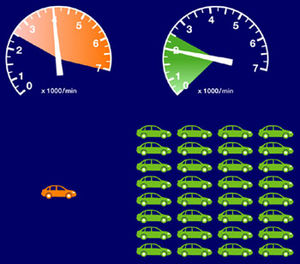ECO-DRIVING improves road safety as well as the quality of the local and global environment and saves fuel and costs. All three benefits are important for furthering ECO-DRIVING. Different benefits facilitate bringing ECO-DRIVING to different stakeholders and policy fields and their activities.
Additionally ECO-DRIVING provides direct benefits to the drivers and the passengers: More comfort and a relaxed atmosphere.
Fuel Consumption and Climate Protection
ECO-DRIVING trainings lead to consumption reduction up to 20% directly after training and about 5% in the long run. The European Climate Change Programme calculated a reduction potential of ECO-DRIVING of at least 50 million tons of CO2-emissions in Europe by 2010, saving about 20 billion EUROS.
In the year 2000, ECO-DRIVING trainings in the Austrian bus company NIGGBUS reduced fuel consumption by 5% in day-to-day driving. The effect increased up to 7% in the year 2001.
Local Environment and Health
ECO-DRIVING reduces noise pollution as well as local air pollution. The engine noise of one car driving with 4000 rpm (revolutions per minute) equals the engine noise of 32 cars at 2000 rpm. Thus, ECO-DRIVING reduces one of the main problems of traffic in urban areas.

One vehicle travelling with 4000 rpm produces the same amount of noise as 32 vehicles travelling at the same speed with only 2000 rpm.
Costs and Safety
ECO-DRIVING reduces not only fuel costs, but also costs for maintenance and costs for repairing cars after accidents. The safer driving behavior results from:
- An anticipating driving style
- Maintaining a steady speed
- Less speeding
- Less overtaking
- Less stress/aggressiveness
Eleven month after ECO-DRIVING trainings, the German company HAMBURGER WASSERWERKE effected fuel consumption reductions of more than 6%, accidents and related costs could be deminished by more than 25%.
ECO-DRIVING programmes prove to be very cost-effective. The Dutch ECO-DRIVING programme results in a cost-effectiveness of about 5 EURO per avoided ton of CO2-emissions over a period of 10 years.
CANON COMPANY in Switzerland trained the ECO-DRIVING style with 350 service car drivers in VSZ VELTHEIM. The drivers reduced fuel consumption by 6.1%, had 22% more km per accident and 35% less accidents in total.
